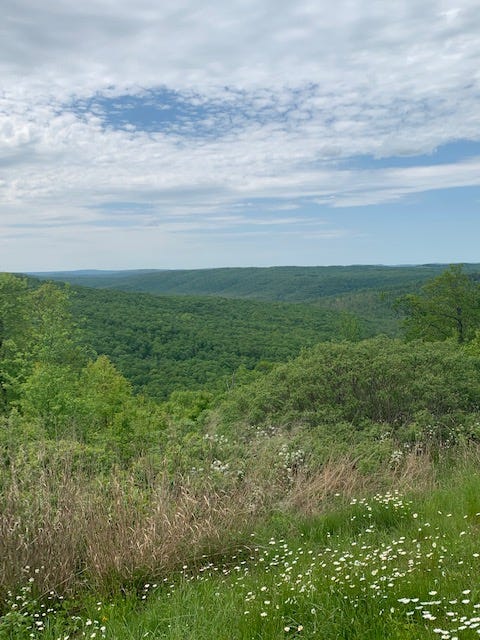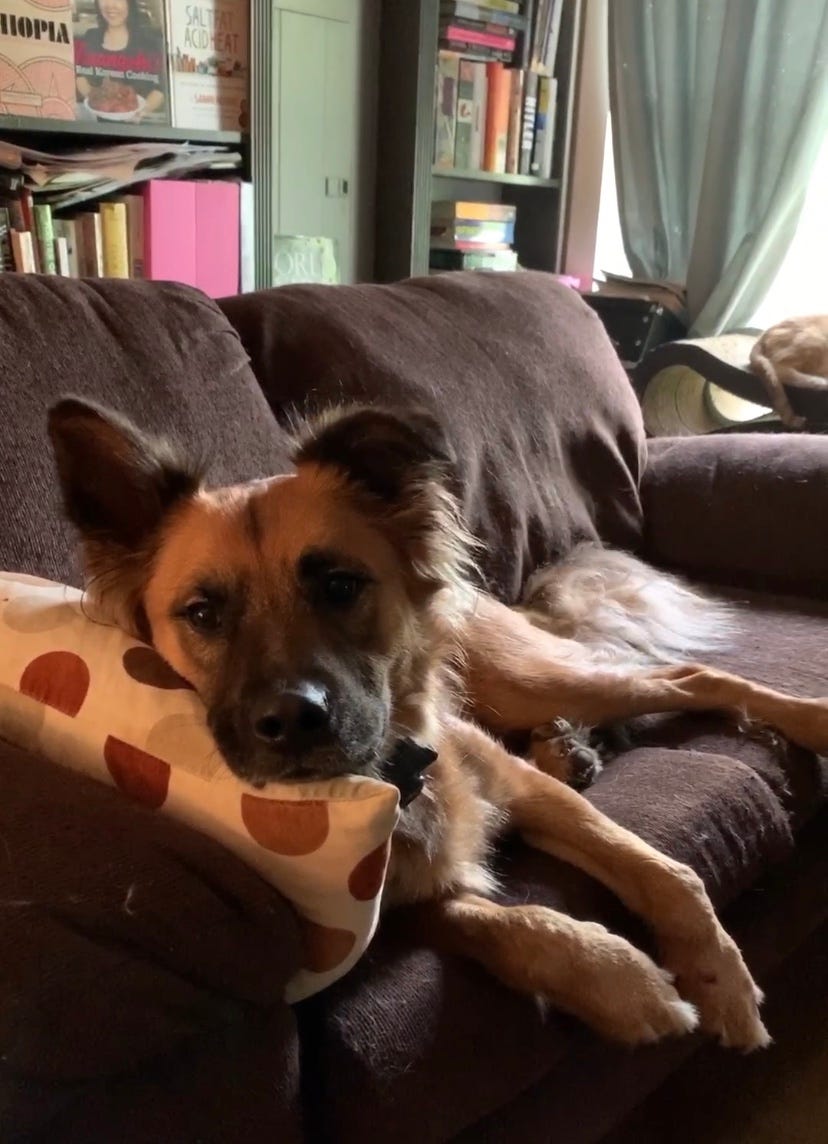Whenever I see those cell phone data maps showing where Americans are staying home the most, I wonder how much of what the data is capturing is just the difference between urban and rural life. They could just be maps of who has access to UberEats and Instacart and who doesn’t, or who lives in a place where people go driving around for fun.
Today, we went driving around for fun. I made crumb cake for my mom, for Mother’s Day, and took it to her house for a brief, socially-distanced visit according to our new custom: My partner Samir and I sit on the grass while she sits on her porch with her dog Milo and we chat. When we left we realized we weren’t ready to go home. And so we headed in the opposite direction, driving west on a rural highway up Alread mountain.

It’s one of our favorite drives, steep and twisting, with mountain vistas at almost every turn. There is also almost never anyone else on the road. (Except on one drive we saw a bunch of Subarus pass our Subaru and decided to follow them, like we were being called to the mothership, and stopped to watch them all race in a muddy field.)
The highway leads to a few small towns that don’t really exist as towns any more. We pass through Crabtree, which now is just a cluster of houses where, for some reason, bunny yard decorations are popular. At the top of the mountain we hit Alread. Alread was always a small, isolated community filled with farmers and a few hippie back-to-the landers who grew natural foods and recycled before the rest of us did. When I was young, Alread had its own school system with just a few people in each class. I think four students graduated its high school the same year I graduated from Clinton. After I left, though, in 2003 and 2004, a new law got rid of school districts with enrollment below 350 students from kindergarten through twelfth grade. To survive, schools had to merge with another nearby district, consolidate, or be absorbed into a larger one. It does not surprise me that most of the schools that were closed through this law were majority African American and/or majority poor. There went the Alread district (79 percent of its students lived in poverty) and one other district in our county. Most of the districts that were absorbed into larger ones lost their governing power, subsumed instead into bigger (or whiter) towns with bigger politics.
I don’t know when Alread lost its post office, or if it ever had one, but I do know that from 2007 to 2011 there were long lists of closures under a postal service program called, very bureaucratically, “Retail Access Optimization Initiative.” Other nearby towns—Prim, Fox—fought successfully to keep theirs. Losing a post office, as well as losing a school, is a kind of death. I know people in Alread are very tight-knit and community-oriented, but there are few ways that people outside of Alread can register its existence. If you want to send a letter to Alread, the address will read “Clinton, AR,” even though its a thirty-minute drive away, because our post office handles mail sent there. If you are from Alread, you graduate from Clinton High School. Does a town exist if you never write its name down? The old school at Alread is now a community center that hosts events throughout the year, but many of the people who go there live elsewhere now and use these events as homecomings. Alread is not too far from another small town that has nearly disappeared in the same way called Welcome Home, for which I named this newsletter. I find it so warm and cozy as a town name, but also ironically sad: Welcome Home to a town that no longer exists.
Alread is our favorite place. We often talk about buying land out there and what that would mean, especially while we’re driving by the open pastures and valley views. We would have to learn first aid and subscribe to MedFlight services in case something happened. In a fire or medical emergency, we’d be mostly on our own. (There is a small volunteer fire department, but any sheriff’s deputy would be a half-hour away.) We’d probably need guns for bears and bobcats, frequent tormentors out in Alread. I always say, “We’d have to build a predator fence,” and Samir says, “You just like to say ‘predator fence.’” Our trips for groceries would be infrequent and we’d need to store more food than we do now. Today, we drove past even Alread, into the forest, until Samir got an eerie feeling. “It just got really jungly,” he said. I realized the eeriness came from the complete and utter quiet; the absence of human sounds.
I don’t know what quarantine would be like if we didn’t have access to this nature palace, but I know my sister, who lives in New York City, has been losing her mind without access to space outdoors. People already think the pandemic is the death knell for big cities as residents crave less densely populated areas. That thinking stems from losing the benefits of cities, like restaurants, arts institutions, and communal spaces, while experiencing all of the downsides, like a disease’s rapid spread in apartment buildings and subways. The wild outdoors has its downsides, too. We had no cell service during our drive. If we’d crashed or had another emergency, I don’t know how we would have gotten help.
I think a lot about the sacrifice New Yorkers and other city dwellers are making: being stuck in small apartments, listening to the sounds of ambulances coming for their neighbors, cheering together every night for the workers desperately trying to stay ahead of the pandemic. Yet here, with all of this beauty, people have returned to normal, as if none of that has happened or continues to happen. So reluctant to give up normal life that they’re out and about, without masks, getting their hair cut, going shopping.
A Note About Typos:
I will have a lot of them. I try to read through several times, but no one person can catch them all. Publications have layers of editors, and typos still sometimes get through. I usually catch them after I hit publish (because that is how it always works) and I will change them on this site, but I can’t change them in emails. Many apologies in advance!
What I’m Recommending:
This Adam Serwer piece about how the pandemic has laid bare America’s racial contract.
Cute Animal Pic of the Week:
Banjo is ready for a walk in the park. He’s bored of staying at home.



